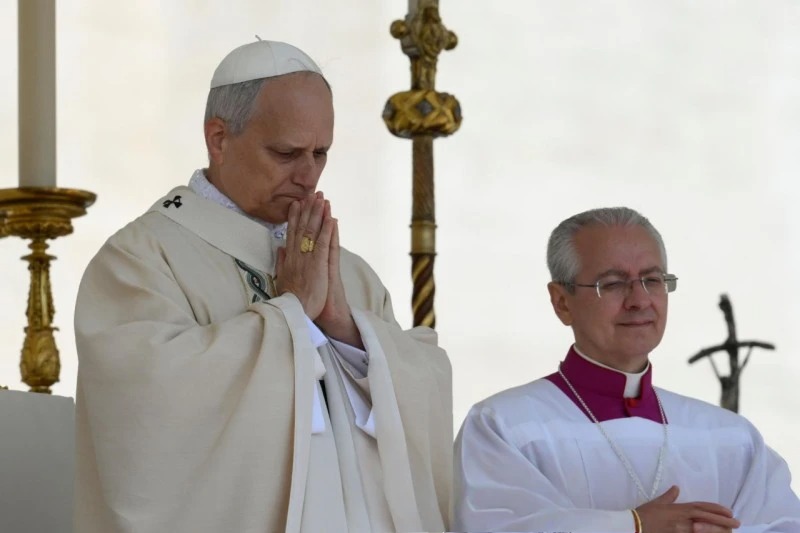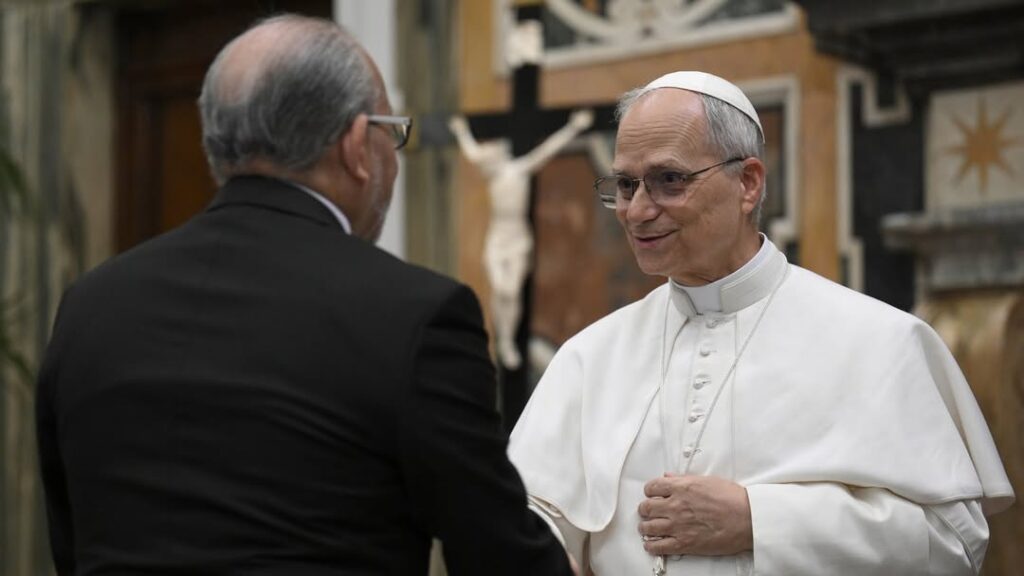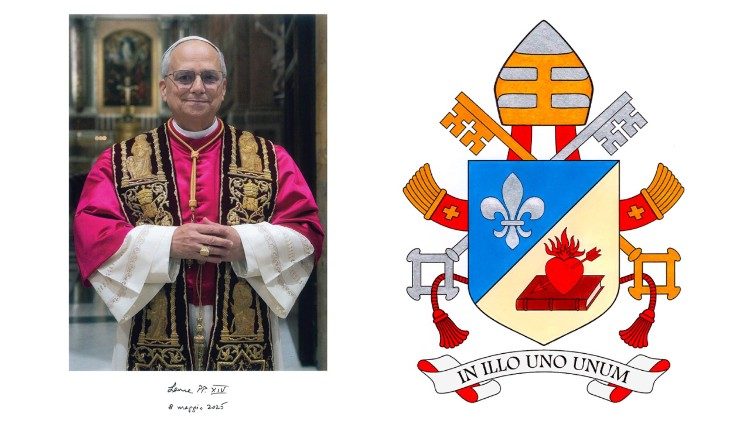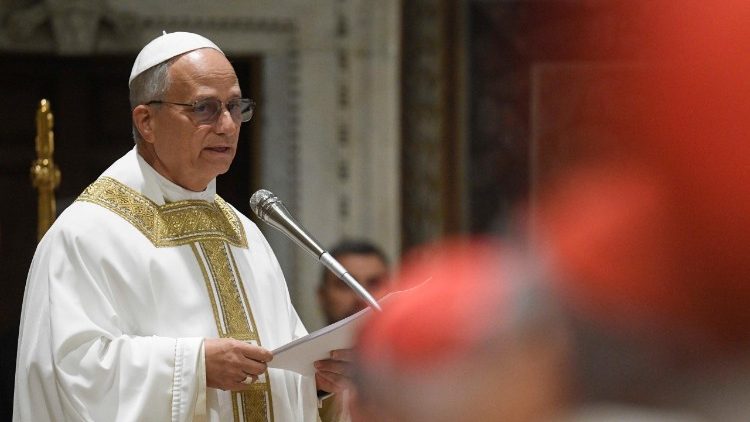Leo proclaims the Gospel of love, unity, compassion, and fraternity
Homily, Mass for the official opening of his Petrine ministry, and Regina Caeli

At 10:00 a.m. today, the Fifth Sunday of Easter, the Holy Father Leo XIV presided, on the parvis of the Vatican Basilica, at the Mass for the official opening of his Petrine ministry.
Before the Eucharistic celebration, the Pope, along with the Patriarchs of the Eastern Churches, descended to the Tomb of St. Peter beneath the Vatican Basilica, paused in prayer, and incensed the Apostolic Trophy.
On his return to the Basilica, the Holy Father joined the procession of concelebrating Cardinals who, preceded by deacons carrying the Pastoral Pallium, the Fisherman’s Ring, and the Book of the Gospels, arrived at the altar on the parvis of the Basilica to the singing of Lauds Regiae.
During the Eucharistic Celebration, after the proclamation of the Gospel, the specific rites of the beginning of the pontificate took place: the imposition of the Pallium by Cardinal Deacon Mario Zenari, with a prayer recited by Cardinal Priest Fridolin Ambongo Besungu, O.F.M. Cap. Frank Leo (for North America), Card. Jaime Spengler, O.F.M., (for South America) and Card. John Ribat, M.S.C., (for Oceania). Also in attendance at the service of the Holy Father were representatives of the People of God: the Bishop of Callao (Peru), His Eminence. Luis Alberto Barrera, M.C.J., Priest; the Rev. Guillermo Inca Pereda, Deacon; Teodoro Mandato; Religious: Sr. Oonah O’Shea, President of the International Union of Superiors General, and Fr. Arturo Sosa, S.I., President of the Union of Superiors General, a married couple, Rafael Santa María and Ana María Olguín, and the young Josemaría Díaz and Sheyla Cruz.
During the Holy Mass, concelebrated with the Cardinals, Patriarchs, and Major Archbishops of the Eastern Catholic Churches, the Holy Father Leo XIV delivered the homily reproduced below:
***
Homily of the Holy Father
Dear Brother Cardinals, Brother Bishops and Priests, Distinguished Authorities and Members of the Diplomatic Corps, and those who traveled here for the Jubilee of Confraternities, Brothers and Sisters:
I greet all of you with a heart full of gratitude at the beginning of the ministry that has been entrusted to me. Saint Augustine wrote: “Lord, you have made us for yourself, and our heart is restless until it rests in you” (Confessions, I: 1,1).
In these days, we have experienced intense emotions. The death of Pope Francis filled our hearts with sadness. In those difficult hours, we felt like the crowds that the Gospel says were “like sheep without a shepherd” (Mt 9:36). Yet on Easter Sunday, we received his final blessing and, in the light of the resurrection, we experienced the days that followed in the certainty that the Lord never abandons his people, but gathers them when they are scattered and guards them “as a shepherd guards his flock” (Jer 31:10).
In this spirit of faith, the College of Cardinals met for the conclave. Coming from different backgrounds and experiences, we placed in God’s hands our desire to elect the new Successor of Peter, the Bishop of Rome, a shepherd capable of preserving the rich heritage of the Christian faith and, at the same time, looking to the future, in order to confront the questions, concerns and challengeso f today’s world.
Accompanied by your prayers, we could feel the working of the Holy Spirit, who was able to bring us into harmony, like musical instruments, so that our heartstrings could vibrate in a single melody. I was chosen, without any merit of my own, and now, with fear and trembling, I come to you as a brother, who desires to be the servant of your faith and your joy, walking with you on the path of God’s love, for he wants us all to be united in one family.
Love and unity: these are the two dimensions of the mission entrusted to Peter by Jesus. We see this in today’s Gospel, which takes us to the Sea of Galilee, where Jesus began the mission he received from the Father: to be a “fisher” of humanity in order to draw it up from the waters of evil and death. Walking along the shore, he had called Peter and the other first disciples to be, like him, “fishers of men”.
Now, after the resurrection, it is up to them to carry on this mission, to cast their nets again and again, to bring the hope of the Gospel into the “waters” of the world, to sail the seas of life so that all may experience God’s embrace.
How can Peter carry out this task? The Gospel tells us that it is possible only because his own life was touched by the infinite and unconditional love of God, even in the hour of his failure and denial. For this reason, when Jesus addresses Peter, the Gospel uses the Greek verb agapáo, which refers to the love that God has for us, to the offering of himself without reserve and without calculation. Whereas the verb used in Peter’s response describes the love of friendship that we have for one another.
Consequently, when Jesus asks Peter, “Simon, son of John, do you love me more than these?” (Jn 21:16), he is referring to the love of the Father. It is as if Jesus said to him, “Only if you have known and experienced this love of God, which never fails, will you be able to feed my lambs. Only in the love of God the Father will you be able to love your brothers and sisters with that same ‘more’, that is, by offering your life for your brothers and sisters.”
Peter is thus entrusted with the task of “loving more” and giving his life for the flock. The ministry of Peter is distinguished precisely by this self-sacrificing love, because the Church of Rome presides in charity and its true authority is the charity of Christ. It is never a question of capturing others by force, by religious propaganda or by means of power. Instead, it is always and only a question of loving as Jesus did.
The Apostle Peter himself tells us that Jesus “is the stone that was rejected by you, the builders, and has become the cornerstone” (Acts 4:11). Moreover, if the rock is Christ, Peter must shepherd the flock without ever yielding to the temptation to be an autocrat, lording it over those entrusted to him (cf. 1 Pet 5:3). On the contrary, he is called to serve the faith of his brothers and sisters, and to walk alongside them, for all of us are “living stones” (1 Pet 2:5), called through our baptism to build God’s house in fraternal communion, in the harmony of the Spirit, in the coexistence of diversity. In the words of Saint Augustine: “The Church consists of all those who are in harmony with their brothers and sisters and who love their neighbour” (Serm. 359,9).
Brothers and sisters, I would like that our first great desire be for a united Church, a sign of unity and communion, which becomes a leaven for a reconciled world. In this our time, we still see too much discord, too many wounds caused by hatred, violence, prejudice, the fear of difference, and an economic paradigm that exploits the Earth’s resources and marginalizes the poorest.
For our part, we want to be a small leaven of unity, communion and fraternity within the world. We want to say to the world, with humility and joy: Look to Christ! Come closer to him! Welcome his word that enlightens and consoles! Listen to his offer of love and become his one family: in the one Christ, we are one. This is the path to follow together, among ourselves but also with our sister Christian churches, with those who follow other religious paths, with those who are searching for God, with all women and men of good will, in order to build a new world where peace reigns!
This is the missionary spirit that must animate us; not closing ourselves off in our small groups, nor feeling superior to the world. We are called to offer God’s love to everyone, in order to achieve that unity which does not cancel out differences but values the personal history of each person and the social and religious culture of every people.
Brothers and sisters, this is the hour for love! The heart of the Gospel is the love of God that makes us brothers and sisters. With my predecessor Leo XIII, we can ask ourselves today: If this criterion “were to prevail in the world, would not every conflict cease and peace return?” (Rerum Novarum, 21).
With the light and the strength of the Holy Spirit, let us build a Church founded on God’s love, a sign of unity, a missionary Church that opens its arms to the world, proclaims the word, allows itself to be made “restless” by history, and becomes a leaven of harmony for humanity. Together, as one people, as brothers and sisters, let us walk towards God and love one another.
REGINA CAELI
As we conclude this celebration, I greet and thank all of you, the people of Rome and the faithful from many parts of the world, who wished to participate.
In particular, I express my gratitude to the Official Delegations from numerous countries, as well as to the representatives of Churches and Ecclesial Communities and other religions.
I extend a warm welcome to the thousands of pilgrims who have come from every continent for the Jubilee of Confraternities. Dear brothers and sisters, I thank you for keeping the great heritage of popular piety alive!
During Mass, I strongly felt the spiritual presence of Pope Francis accompanying us from heaven. Reflecting on our participation in the communion of saints, I recall that yesterday in Chambéry, France, the priest Camille Costa de Beauregard, was beatified. He lived from the end of the 1800s to the beginning of the 1900s, and was a witness of great pastoral charity.
In the joy of faith and communion, we cannot forget our brothers and sisters who are suffering because of war. In Gaza, the surviving children, families and elderly are reduced to starvation. In Myanmar, new hostilities have cut short innocent young lives. Finally, war-torn Ukraine awaits negotiations for a just and lasting peace.
Therefore, as we entrust to Mary the service of the Bishop of Rome, Pastor of the universal Church, let us, from the “Barque of Peter,” look to her, Star of the Sea, Our Lady of Good Counsel, as a sign of hope. We implore her intercession for the gift of peace, for support and comfort for those who suffer, and for the grace for all of us to be witnesses to the Risen Lord.
Related

Leo XIV: Let us build a world based on truth, justice, and peace
Exaudi Staff
16 May, 2025
14 min

Schedule of Celebrations Presided over by the Holy Father Leo XIV (May 2025)
Exaudi Staff
15 May, 2025
1 min

The coat of arms of Leo XIV: a burning heart marked by divine love
Exaudi Staff
15 May, 2025
2 min

Evangelization and Education: A Joint Journey to Transform the World
Exaudi Staff
15 May, 2025
2 min
 (EN)
(EN)
 (ES)
(ES)
 (IT)
(IT)

